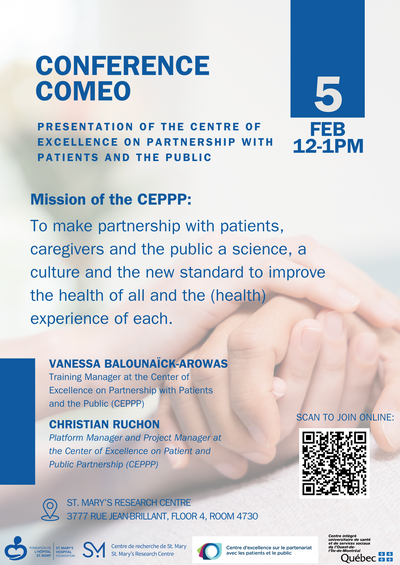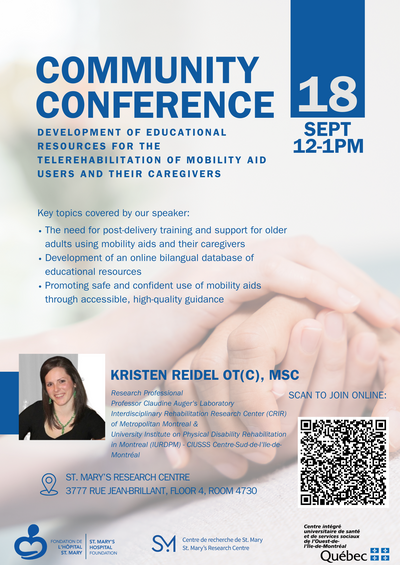St. Mary's Research Centre hosts several monthly knowledge transfer events.
Certain presentations can be credited to clinical staff (Continuing Medical Education). Contact: Christina Raneburger
SMRC Scientific Series
SMRC Scientific Series presentations are self-approved group learning activities (Section 1) as defined by the Maintenance of Certification Program of the Royal College of Physicians and Surgeons of Canada and recognized by the College of Family Physicians of Canada.
SMRC Scientific Series take place a few times a month on Thursdays from 12pm to 1pm.
Click here to join the presentation
Click here to fill out a presentation evalutation and to request a certificate of attendance

JANUARY 29th 2026 – Sophie Lauzier
L'expérience des femmes atteintes de cancer du sein avec l'hormonothérapie adjuvante: Mieux comprendre pour mieux intervenir (français)
This presentation will focus on the work carried out by Prof. Lauzier’s team on the experience of women with breast cancer receiving adjuvant hormone therapy and their adherence to this treatment. She will present findings from studies using a variety of research methods that have made it possible to describe adherence trajectories to adjuvant hormone therapy, document women’s lived experiences, and develop and evaluate two programs aimed at promoting adherence to this treatment.
At the end of this presentation, participants will:
- Be able to define medication adherence and its different components.
- Understand the psychosocial factors that may influence medication adherence.
- Understand the issues associated with adherence to adjuvant hormone therapy among women with breast cancer.
Sophie Lauzier is a Full Professor at the Faculty of Pharmacy at Université Laval and a researcher at the CHU de Québec–Université Laval Research Centre. Prof. Lauzier holds academic training in social and cultural anthropology (M.Sc.), epidemiology (Ph.D., Université Laval), and psychosocial oncology (postdoctoral fellowship, McGill University). Her research program focuses on the psychosocial and behavioral dimensions of treatment use in oncology. Her work aims to identify treatment-use profiles and to develop an in-depth understanding of patients’ experiences, needs, and adherence behaviors. Drawing on her interdisciplinary background, she collaborates with patients and clinicians to design, implement, and evaluate targeted interventions to optimize medication use, both in hospital settings and in community pharmacies. Her methodological approach integrates participatory research as well as qualitative and quantitative methods.

JANUARY 15th 2026 – Sarah Chehayeb
Self-Management Support and Remote Symptom Monitoring for Patients after Allogenic Hematopoietic Stem Cell Transplantation and Their Caregivers: A Mixed-methods Implementability Study
Allogeneic hematopoietic stem cell transplantation (allo-HSCT) is a potentially curative treatment for hematologic cancers. During the first 100 days post-allo-HSCT, patients face risks of complications, such as graft-versus-host disease, infections, and mortality. Despite that, these patients and their caregivers, often family members, are expected to self-manage onerous side effects at home, often without adequate information. Also, after their discharge by day 30, most patients continue to see their healthcare team on a weekly or bi-weekly basis during the first 100 days, leaving gaps where symptoms might go undetected. This can lead to delays in medical management and, in turn, decrease survival rates and increase hospital stay. Self-management support programs give patients and their caregivers practical tools to manage their condition more effectively. These can be supplemented with remote symptom monitoring (RSM) to allow patients to electronically report symptoms (e.g., via a mobile app or email) using patient-reported outcome measures (PROMs) for real-time clinician feedback between clinic visits. Use of PROMs, like self-rating symptoms on a 0–10 scale, could improve patient-clinician communication, patients’ health outcomes, and quality of life (QOL). Even though patients and caregivers experience a considerable symptom burden after allo-HSCT and must engage in daily self-management to avoid complications, a comprehensive self-management support and RSM program is lacking. This project aims to co-design a self-management support and RSM program with patients, caregivers, clinicians, and managers, addressing implementation challenges, and evaluate the program’s feasibility and acceptability in routine post-allo-HSCT care. Using a structured research approach, the program will be co-designed through workshops and tested with patients, caregivers, and clinicians. This project hopes to create a scalable, patient-centred program that improves health outcomes and supports patients and their caregivers in their post-transplant journey.
At the end of this presentation, participants will:
- Describe the self-management challenges faced by patients and caregivers during the first 100 days following allogeneic hematopoietic stem cell transplantation (allo-HSCT).
- Explain how self-management support can be enhanced through remote symptom monitoring (RSM) using patient-reported outcome measures (PROMs) to support timely clinical decision-making.
- Understand the co-design and mixed-methods approach used to develop and evaluate a self-management support and RSM program, including its feasibility, acceptability, and fidelity in a clinical setting.
Sarah is a fourth-year PhD student at the he Ingram School of Nursing at McGill University. She earned a Master of Science in Community and Public Health Nursing in 2022 and a Bachelor of Science in Nursing in 2017, both from the American University of Beirut. As a registered nurse, she spent four years working with adult hematology-oncology and Hematopoietic Stem Cell Transplantation (HSCT) patients at the American University of Beirut Medical Center. Recognizing the challenges faced by patients undergoing allogeneic HSCT (allo-HSCT) after discharge, she developed a training program for oncology nurses as part of her Master’s project to introduce evidence-based self-management strategies for these patients. Her doctoral research focuses on Remote Symptom Monitoring (RSM) and self-management support following allo-HSCT. A recipient of the Cole Foundation Fellowship Award (2024–2026), she is dedicated to advancing research and improving the quality of life of HSCT patients and their families. Her project has received funding from the Leukemia and Lymphoma Society of Canada and the Canadian Cancer Society through the joint Quality of Life grant.

DECEMBER 11th 2025 – Dr. Rick Mah
Trajectories of Frequent Short-term Emergency Department Visits Amoung Older Adults
Brief review of the state of the literature on older adult frequent Emergency department users and the gaps in the literature. In particular, older adults with high intensity short-term ED use are a small yet important population that is poorly understood. Using Quebec wide data from the RAMQ and MSSS, a novel approach—group based trajectory modeling— is used to describe ED utilization in this group which may provide other avenues for research and clinical interventions.
At the end of this presentation, participants will:
- Present an important understudied population of Emergency department users.
- Introduce group based trajectory modelling as a potentially useful methodology in understanding events/behaviors over time.
- Consider potential opportunities in research and clinical interventions based on our findings.
Rick Mah is an emergency physician at St. Mary’s Hospital Centre. He completed medical school at University of Alberta and his Family Medicine residency at McGill. He obtained his Master of Biomedical Informatics from Oregon Health & Science University in 2021. He was chief of the Emergency department at St. Mary’s and the Department of Emergency Medicine for the Centre intégré universitaire de santé
et de services sociaux de l'Ouest-de-l’Île-de-Montréal. His research interests include geriatric emergency medicine, informatics, quality improvement, and ED operations.

DECEMBER 04th 2025 – Yuliya Nikolova, PhD
Neuromodulatory mechanisms at the intersection of brain aging and mental illness
Neuromodulatory brainstem nuclei — in particular the Locus Coeruleus (LC) and Substantia Nigra pars compacta (SNc) — are extremely sensitive to aging, yet their very small size has historically made in-vivo studies challenging. In this talk, the researcher will review recent advances using cutting-edge neuroimaging techniques to assess the structural and microstructural integrity of these nuclei in adult populations at elevated risk for age-related cognitive impairment. She will focus specifically on the role of LC integrity in late-life depression, and on SNc integrity in substance use disorders, highlighting how modern imaging methods open a window into how brainstem neuromodulatory systems contribute to cognitive and clinical vulnerability across the lifespan.
At the end of this presentation, participants will:
- Learn about state-of-the-art imaging methods to assess two major neuromodulatory nuclei in the brain - the locus couruleus (LC) and the substantia nigra pars compacta (SNc)
- Describe age-sensitive biomarkers centered on the LC and SNc
- Understand the utility of these measures as markers of risk for age-related cognitive decline in adults with late-life depression and substance use disorders
Yuliya Nikolova obtained her PhD in Psychology & Neuroscience from Duke University in the United States and completed a postdoctoral fellowship in Translational Neuroscience at the Centre for Addiction and Mental Health (CAMH) in Toronto. She is currently a Scientist in the Neurobiology of Depression and Aging Program at CAMH and an Assistant Professor in the Department of Psychiatry at the University of Toronto. Her works uses translational neuroimaging and genetics approaches to study biological mechanisms underlying brain aging and mental illness across the lifespan.

NOVEMBER 20th 2025 – Dr. Gilles Allali
Encéphalopathie au COVID-19: y a-t-il un lien avec des pathologies neurodégénératives? (french)
This presentation will address the main neurological complications of COVID-19 and its impact on the risk of developing neurodegenerative disorders.
At the end of this presentation, participants will:
- Know the main neurological complications of COVID-19.
- Understand encephalopathy associated with COVID-19.
- Understand the possible links between COVID-19 infections and the risk of neurodegenerative diseases.
Gilles Allali is a neurologist, Director of the Leenaards Memory Center (CHUV), and Professor of Neurology at the University of Lausanne. His clinical work focuses on the care of patients with memory disorders. He is also Editor-in-Chief of the scientific journal Neurodegenerative Diseases.


NOVEMBER 13th 2025 – Bertine Sandra Akouamba, PhD & Sophie Audette-Chapdelaine
Proche aidance au masculin, incluant les communautés ethnoculturelles et d’autres populations spécifiques (french)
This presentation presents the findings of the UÉTMISSS report, which explores the needs, issues, and best practices related to male caregivers and identifies the support services used by them in the literature. In general, these men face emotional, physical, social, economic, and legal challenges. Needs vary among specific subpopulations, including men in general, those from ethnocultural communities, the LGBTQ2A+ community, rural areas, and older men. These findings highlight the need to develop targeted interventions, tailored and inclusive support programs, and holistic and flexible approaches to meet their diverse needs.
At the end of this presentation, participants will:
- Understanding the issues related to male caregiving, taking into account the differences between male subpopulations: By the end of the conference, healthcare professionals will be able to describe the main emotional, physical, social, economic, and legal challenges faced by male caregivers.
- Analysis of needs and practices: By the end of the conference, healthcare professionals will be able to identify the specific support needs of male caregivers and recognize best practices from the literature aimed at improving their well-being and engagement in the caregiving role.
- Application of intervention approaches: By the end of the conference, healthcare professionals will be able to propose tailored, inclusive, and holistic interventions and support programs that promote a more effective response to the diverse needs of male caregivers in different sociocultural contexts.
Scientific advisor at the UÉTMISSS of the CIUSSS ODIM and holder of a doctorate and Lean Six Sigma certification, Bertine Sandra Akouamba has over 25 years of experience in research and in the field of health and social services. She has worked at the University of Montreal, CHU Sainte-Justine, INESSS, and is a member of the RENARD team. Author of scientific articles and decision-making tools, she has been giving lectures since 2000.
Scientific advisor at the UÉTMISSS of the CIUSSS-ODIM, Sophie Audette-Chapdelaine has 20 years of experience in research and scientific outreach in health, social services, law, education, and anthropology. Co-founder of a university laboratory and author of scientific articles, she has given numerous lectures since 2005.

NOVEMBER 06th 2025 – Stephen Milford, PhD.
When AIs Take Over: Some Unforseen Risks
Medical AI is already a reality among many healthcare professionals. However, recently it is patient's themselves who are beginning to use AI for their own healthcare challenges. This lecture explores the ethical and ontological risks posed by patient-facing medical AI (pfmAI), particularly in the form of chatbots used for diagnosis and treatment support. While these technologies promise faster, more accessible, and cost-effective healthcare, they also risk undermining the relational and narrative dimensions essential to personal identity. Drawing on the framework of relational ontology and narrative ethics, the lecture argues that pfmAIs may simulate care without offering genuine recognition, displacing the moral labour of human interaction with algorithmic efficiency. Through the concepts of ontological confusion, relational drift, and the erosion of communal health narratives, the talk critically examines how AI systems risk reducing patients to data points within optimised workflows — flattening the dialogical self into a monologic, legible identity. These risks are not simply technical bugs to be fixed, but structural consequences of how AI is integrated into modern healthcare systems. The lecture concludes by calling for a moral architecture of care in which AI complements — but never replaces — the relational work of human moral agents. Only then can we ensure that medicine remains personal, dialogical, and ethically grounded in our shared human vulnerability.
At the end of this presentation, participants will:
- Critically assess the ethical and ontological risks posed by patient-facing medical AI (pfmAI), particularly in relation to personal identity, relational care, and narrative self-understanding.
- Understand how AI-driven healthcare technologies may reshape or displace the moral labour traditionally embedded in human clinician–patient relationships.
- Develop criteria for designing AI tools that support — rather than undermine — dialogical, person-centred care.
Stephen Milford began his studies in theology at the University of Johannesburg and went on to complete a masters degree at Trinity College, Dublin. In 2011 he completed a second masters at Oxford University, before spending two years reading at King’s College London. In 2017 he completed his PhD at the Protestant Theological University, The Netherlands in the area of anthropology, human dignity, value, relational ontology and post-liberal studies. In2024 he completed a second PhD in biomedical ethics with a focus on AI in healthcare. His research interests lie in questions of identity, human rights and ethics, all with a focus on relational ontology, human uniqueness and unsubstitutability. He is currently involved in a number of project at the IBMB including AI in healthcare; the ethical questions raised by automation; loneliness and pandemic management plans; and is currently PI on a project on NLP AIs in Health Care.

OCTOBER 29th 2025 – Clémence Lelaumier
Accompagnement des visiteurs de personnes présentant une maladie neurodégénérative en EHPAD : intérêt d'un outil numérique (French)
This presentation explores the impact of neurodegenerative diseases on relationships. It examines existing digital tools, their benefits and limitations, before outlining the transition from a field request to a participatory research program. Finally, the initial descriptive results of this approach will be presented, offering insights for future interventions.
At the end of this presentation, participants will:
- Recognize the condition of visitors beyond caregivers
- Raise awareness of the role of digital technology in healthcare
- Explore the benefits of play
After three years of clinical practice as a neuropsychologist, Clémence Lelaumier is currently a PhD candidate in neuropsychology at the Inserm U1077 NIMH research unit, funded by a CIFRE grant with the company Wivy. Her research focuses on auditory virtual reality and its potential for developing assessment and rehabilitation tools for post-stroke recovery. At Wivy, she leads a research program on social interaction, recreational activities, and identity in individuals with neurocognitive disorders.

OCTOBER 23rd 2025 – Timothy H. Wideman
Suffering: Getting to the heart of the pain problem (English)
Chronic pain is one of the most prevalent and costly health conditions. For many people, the most challenging aspect of living with chronic pain is that it causes considerable personal suffering. Yet, researchers and clinicians lack basic resources to help recognize, understand and target suffering that is caused by pain, or pain-related suffering. This presentation aims to review what we know, and don’t yet know, about pain-related suffering and then to offer reflections on directions for future research and practice. A core defining aspect of pain-related suffering is disruption to one’s sense of self. This can involve pain disrupting one’s self-identity, such as when pain undermines engagement in important life domains (work, family, social life). This can also involve pain disrupting one’s capacity to navigate basic functions of daily life, such as control over one’s thoughts, emotions or actions. Understanding these different modes of self-disruption is expected to be vital to recognizing suffering among people living with chronic pain. This presentation will explore how pain-related suffering can be situated within our broader understanding of pain, as well as clinical implications for clinical care.
At the end of this presentation, participants will:
- Understand the latest literature on pain-related suffering
- Be able identify two inter-related modes of pain-related suffering
- Develop strategies for recognizing and addressing suffering among patients living with pain
Timothy Wideman is a physiotherapist and associate professor at McGill University. His research focuses on better understanding and managing pain and suffering. He has published his work in the leading pain and rehabilitation journals and received several national awards for excellence in research and teaching.

OCTOBER 09th 2025 – Dr. Saima Hassan
The role of the 21-gene recurrence score in hormone receptor positive breast cancer: the Quebec experience (English)
While lymph node involvement has classically been shown to be the strongest prognostic marker in breast cancer, the 21-gene recurrence score has been shown to play an important role in predicting the need for adjuvant chemotherapy in the context of hormone receptor positive breast cancer, for patients with lymph node negative and lymph node positive disease. We conducted an observational multi-center study to better understand the impact of the 21-gene recurrence score on treatment decisions in Quebec in two important contexts: adjuvant and neoadjuvant settings. We observed that in the adjuvant setting, amongst 1-3 node-positive patients, physician recommendation for chemotherapy was reduced by 67% and overall reduction in cost by 73%. In the neoadjuvant setting, amongst node-negative patients, physician recommendation for chemotherapy was reduced by 38% overall, suggesting the potential role for the 21-gene recurrence score in this context.
At the end of this presentation, participants will:
- Better understand the role of the 21-gene recurrence score in hormone receptor-positive node-positive breast cancer patients
- Better understand the role of the 21-gene recurrence score in hormone receptor-positive node-negative patients in breast cancer patients in the neoadjuvant setting
- Current controversies in hormone receptor positive breast cancer: different genomic tests, pre-menopausal patients, adjuvant CDK 4/6 inhibitors
Born and raised in Montreal, Dr. Saima Hassan is a former McGill graduate, having earned her medical degree, PhD in breast cancer metastasis, and completed her residency in general surgery. She then pursued a clinical fellowship in Surgical Oncology at the University of Toronto, and further post-doctoral training at Oregon Health and Science University in Portland, Oregon, where she started to perform pre-clinical evaluation of PARP inhibitors in triple-negative breast cancer. Dr. Hassan started her practice in 2016 as a surgical oncologist at the CHUM and scientist at the CRCHUM. Dr. Hassan is an Associate Professor and the Scotiabank Chair in the diagnosis and treatment of breast cancer at Université de Montréal. She has been implicated in over 70 clinical trials and involved in over 60 scientific presentations. Through her integrated role as a surgeon, scientist, and academic leader, she is striving to bring novel diagnostic and therapeutic approaches to breast cancer patients.

OCTOBER 02nd 2025 – Tracie Barnett
Leveraging the built environment to promote physical activity in primary care settings (English)
From the start of her career, Dr Barnett has tried to better understand our everyday environments, and how these impact our health. She will share some foundational work exploring the influence of environmental features and phenotypes on health and related behaviours. She will also present ongoing efforts aiming to translate this evidence-base, in which she is co-developing strategies, with a large multidisciplinary team, to implement a contextually tailored, effective behaviour change intervention in low resource settings, designed to increase physical activity in individuals at risk of developing NCDs.
At the end of this presentation, participants will:
- Identify broad features of the built and social environment and methods used in their assessment
- Appreciate how environmental features might impact cardiometabolic health
- Consider potential clinical applications in the context of the promotion of cardiometabolic health
Associate professor in the Department of Family Medicine, and researcher at the CR du CHU Sainte-Justine. She is scientific director of the Qc Unité de Soutien SSA (Expertises complémentaires) and co-director of the McGill Partenariat patient/public antenna. She is also co-director of the FRQ-S CMDO (Cardimetabolic health, Diabetes and Obesity) Network. Trained in epidemiology and health promotion, her research focuses on the natural history of obesity and related behaviours, and their metabolic consequences. In addition to identifying salient characteristics and creating meaningful indicators within built environments and social networks, and monitoring how these evolve over time, she is developing strategies with collaborators including clinical and patient partners to promote cardiovascular health by leveraging individual and environmental resources in primary care settings and in the community.

SEPTEMBER 25th 2025 – Andréa Faust
Le Centre d'excellence pour la santé durable des aînés Schouela CEDurable
This presentation will focus on the Simone and Edouard Schouela Center of Excellence for Sustainable Senior Health (Schouela CEDurable) of the McGill Integrated University Health and Social Services Network (RUISSS), based at the Integrated University Health and Social Services Center (CIUSSS) of the West-Central Montreal Island. This center is dedicated to implementing validated interventions aimed at improving the well-being of seniors in the regions served by the McGill RUISSS.
The different areas of intervention (Axis 1: Transformative technologies, artificial intelligence, virtual care, and adapted living environments; Axis 2: Big data and predictive analytics; Axis 3: Communities of practice and education; Axis 4: Autonomy, mobility, and independence) as well as the projects will be presented. Clinical teams, clinicians, and centers will have the opportunity to learn more about Schouela CEDurable and determine if collaboration is possible.
At the end of this presentation, participants will:
Describe the mission, objectives, and areas of intervention of the Schouela CEDurable Center of Excellence in the context of population aging.
Analyze validated clinical and community approaches that promote the maintenance of autonomy and well-being among seniors.
Discuss opportunities for interdisciplinary and interinstitutional collaboration to improve clinical practices, knowledge transfer, and innovation.
Andréa holds a bachelor’s degree as well as a research master’s degree in kinesiology. She also completed a master’s degree in project management, which complements her research background by providing her with skills to structure, coordinate, and manage projects effectively and rigorously. Her professional experience has mainly focused on older adults and physical activity, a field that remains central to her interests and fuels her commitment to promoting healthy aging. She is also co-founder of the SAFE foundation and co-creator of Safe Seniors, a web platform of exercises specifically designed for frail seniors to support their autonomy and well-being.


SEPTEMBER 04th 2025 – Dr. Bertrand Lebouché & Dr. Yuanchao Ma
AI for Person-Centred Care: The MARVIN Chatbot in HIV and Beyond (English)
This presentation introduces MARVIN, a co-designed AI-driven chatbot developed with patients, clinicians, and engineers to enhance self-management in HIV and other chronic diseases. It highlights the urgent challenges in primary care, where patients must manage complex information and providers face burnout and resource shortages.
By embedding patient partnership throughout design, MARVIN fosters trust, privacy, inclusivity, and shared decision-making. The talk underscores the principles of responsible AI — fairness, transparency, sustainability, and equity — as essential for safe and ethical implementation.
Finally, it explores how MARVIN and similar tools can extend beyond HIV, offering human-centered digital companions that modernize care without replacing human empathy.
At the end of this presentation, participants will:
- Understand the challenges of self-management and equity in HIV and chronic disease care, and how AI can help address them.
- Explore the codesign and implementation of MARVIN, a patient-centred AI chatbot co-developed with people living with HIV, clinicians, and engineers.
- Apply principles of responsible AI — fairness, transparency, sustainability, and inclusivity — to guide the ethical use of digital health innovations in diverse care contexts.
Dr. Bertrand Lebouché is an Associate Professor in the Department of Family Medicine of the Faculty of Medicine and Health Sciences at McGill University and a clinician Scientist at the Research Institute of the McGill University Health Centre. Dr. Lebouché's research interests centre on how to improve HIV care and prevention using PROMS and connected medicine and AI-based chatbots, particularly, by meaningfully involving patients in research. Dr. Lebouché holds a CIHR Strategy for Patient-Oriented Research (SPOR) Chair in Innovative Clinical Trials. He is a also a recipient of the 2023 CAHR-CANFAR Excellence in HIV Research Award in Clinical Sciences for Canada.

JUNE 26th 2025 – Sydney Wasserman
The right support for the right person, at the right time: Real-world implementation of a stepped care, interdisciplinary post-radiation rehabilitation program for survivors of head and neck cancer
This presentation offers insights into Sydney Wasserman’s PhD thesis work, highlighting the background that brought this project to where it is today and the proposed work for this implementation study. The study has two objectives: 1) To finalize the co-design of a novel stepped care rehabilitation intervention, guided by the ORBIT (Obesity-Related Behavioral Intervention Trials) intervention development framework, to increase access to interdisciplinary survivorship rehabilitation support for head and neck cancer patients (TEMPO-ORL: which stands for Tailored, wEb-based, self-Management and Physical activity program - Oto-Rhino-Laryngology), and 2) To evaluate the implementability (i.e., feasibility, acceptability, and fidelity) of TEMPO-ORL.
At the end of this presentation, participants will:
- Identify the key components of a digital health behavioural intervention.
- Understand the stepped care approach to intervention implementation to ensure the right amount of the right support for the right person.
- Explore approaches for co-designing digital health interventions with stakeholders in cancer care (including patient partners and clinical partners)
Sydney Wasserman is a registered nurse clinician and current PhD student under the supervision of Dr. Sylvie Lambert. Her research focuses on developing psychosocial behavioural interventions to support self-management among patients and caregivers living with cancer. Drawing on her clinical experience, Sydney is dedicated to improving health equity by optimizing resources and leveraging technology to make healthcare more accessible for all patients and their caregivers. Her work is driven by a strong commitment to empowering individuals to take an active role in their care, particularly through self-management and preventative health behaviour change strategies.


JUNE 19th 2025 – Dr. Rachel Pope & Dr. Christina Farr
The Microbiome of the Neovagina
At the end of this presentation, participants will:
- Describe the typical microbiome in transwomen
- Learn about the basics of HPV in the genitals
- Learn about a longitudinal clinical and scientific collaboration
Dr. Rachel Pope is a board-certified obstetrician and gynecologist. After residency, she completed a fellowship in global women’s health, focusing on the repair and reconstruction of obstetric-related vesico-vaginal and recto-vaginal fistulas. She lived and worked in Malawi, in Southern Africa for four years and served as the medical director of the Fistula Care Center and fellowship director for Global Women’s Health at Baylor College of Medicine. She is currently the chief of the Female Sexual Health division and part of the Gender Care program in the Urology Institute at University Hospitals Cleveland Medical Center. She also leads the global health program in the Institute where there is an international collaboration between Urologists and Gynecologists in the US and three centers in West and East Africa. Dr. Pope is the founder of “Our Womanity,” an online platform to empower women to know their bodies and co-founder of “The Menopause Retreat,” an experiential process for women to talk and connect to other women going through perimenopause and menopause. Her clinical practice surrounds female sexual health, vaginal reconstruction and her research interests are in health disparities and social determinants of health.
Dr. Christina Farr is an Assistant Professor of Pathology and Member of the Center for Global Health and Diseases at Case Western Reserve University. She received her PhD from the University of British Columbia and completed a Postdoctoral Fellowship at the University of Manitoba. Dr. Farr’s research is focused on host-microbe interactions that influence human urogenital health and disease, with a particular interest in cervicovaginal innate immunity and the microbiome. Current research projects in her lab are focused on HIV, cervical cancer, infertility, and transgender health.

JUNE 16th 2025 – Dr. Karen Bandeen-Roche
Resilience-to-Frailty in Older Adults: A Window on Lifelong Health
The physical resilience concept aims to promote positive outcomes following stressors to older adults. To achieve this aim, we must determine physiologic mechanisms underlying either capacity to respond resiliently, or, when critically dysregulated, frailty. The Johns Hopkins Older Americans Independence Center studies the resilience-to-frailty spectrum: First, its major concepts and research contributions are outlined. Then, we describe the recent Study of Physical Resilience and Aging, which implemented stimulus-response tests to characterize physiological fitness in older adults scheduled for major stressors (e.g., total knee replacement-TKR). We report work to develop physiologic resilience measures from these stimulus-response data and study their associations with functional resilience following TKR, which builds on a recently published pilot study. Our study lays groundwork to better foster older adults’ resilience to stressors and, ultimately, overall health.
At the end of this presentation, participants will:
- Describe the dynamical systems theory of physiological fitness underlying physical resilience (when fit) and frailty (when fitness is lost).
- Describe the stimulus-response paradigm for studying physiologic resilience capacity as a dynamical system.
- Describe evidence consistent with the dynamical systems theory noted above, derived in the Study of Physical Resilience in Aging.
Dr. Bandeen-Roche is Professor and Emeritus Chair of the Department of Biostatistics at Johns Hopkins University (JHU). She works at the interface of quantitative and gerontological science. Her gerontologic research aims to understand the causes and delay the course of physical disability, cognitive decline, and frailty in older adults, and promote resilience. Statistically, she specialized in latent variable and multivariate outcome modeling. She leads the JHU Training Program on the Epidemiology and Biostatistics of Aging and JHU Older Americans Independence Center. She is a Fellow/Member of the American Statistical Association, Gerontological Society of America, and US National Academy of Medicine.

JUNE 12th 2025 – Dr. Chelsia Gillis
Better prepared, better repaired: An introduction to surgical prehabilitation
This presentation will provide an introduction to surgical prehabilitation. Prehabilitation is a process from diagnosis to surgery, consisting of one or more preoperative interventions of exercise, nutrition, psychological strategies and respiratory training, that aims to enhance functional capacity and physiological reserve to allow patients to withstand surgical stressors, improve postoperative outcomes, and facilitate recovery.
At the end of this presentation, participants will:
- Define surgical prehabilitation and describe its core components, including exercise, nutrition, and psychosocial support.
- Explain the rationale for prehabilitation and how it supports recovery and improves postoperative outcomes.
- Identify which patients may benefit most from prehabilitation.
Chelsia Gillis, PhD, RD, CNSC, is an Assistant Professor in the School of Human Nutrition at McGill University and an Associate Member in the Departments of Surgery and Anesthesia. She holds a Tier II Canada Research Chair in Perioperative Nutrition and serves as Director of Medical Research at the PeriOperative Program at the Montreal General Hospital. Dr. Gillis is a Registered Dietitian and Certified Nutrition Support Clinician®, with an MSc in Human Nutrition from McGill University and a PhD in Epidemiology from the University of Calgary.

JUNE 5th 2025 – Dr. Alyson Mahar
Cancer care and outcomes for adults with intellectual or developmental disabilities: research and advocacy
This presentation aims to provide an overview of the limited Canadian research documenting inequities in cancer outcomes and care for adults with intellectual or developmental disabilities and an introduction to the mechanisms that may contribute to these disparities. The presentation will discuss opportunities to address gaps in knowledge and ableism in cancer research and care delivery.
At the end of this presentation, participants will:
- Identify structural and systemic pathways to worse cancer outcomes for adults with intellectual or developmental disabilities.
- Describe disparities along the cancer continuum for adults with intellectual or developmental disabilities from diagnosis to palliative care.
- Discuss opportunities to engage adults with intellectual or developmental disabilities, their families and loved ones, and service providers in cancer research.
Alyson Mahar, PhD, is an Assistant Professor in the School of Nursing at Queen's University. She is a cancer epidemiologist and health services researcher in the Division of Cancer Care and Epidemiology in the Sinclair Cancer Research Institute. Alyson is funded by the Canadian Cancer Society as an Emerging Scholar for her research program focused on the equitable delivery of cancer care in Canada (MEGAN-CAN).

MAY 1st 2025 – Dr. Andrea Knittel
Isn't there a better way? Using research to address disparities at the intersection of perinatal substance use disorders and incarceration.
This presentation describes the epidemiology of pregnancy and substance use in the criminal legal system in the US and Canada and highlights ways that research can be used to mitigate health disparities related to perinatal incarceration for people with substance use disorders (SUD). This includes examples of quantitative and qualitative research using exploratory and descriptive analysis, implementation science, and clinical trial design.
At the end of this presentation, participants will:
- Be able to describe the current state of perinatal incarceration and the overlap with perinatal SUD in the US and Canada.
- Be able to analyze the gaps in availability of SUD treatment that occur as a result of perinatal incarceration.
- Be able to identify multiple levels of interventions that might improve MOUD and SUD treatment access for pregnant and postpartum people who are involved in the criminal legal system.
Andrea K. Knittel, MD PhD is an Associate Professor of Obstetrics and Gynecology with tenure at the University of North Carolina at Chapel Hill. She serves as the Medical Director for Carceral Obstetrics and Gynecology and the Fellowship Director for the UNC General Obstetrics and Gynecology Research Fellowship. She completed her MD and PhD degrees at the University of Michigan, Ann Arbor, and her OB/GYN residency at the University of California, San Francisco. Dr. Knittel is a clinician and researcher focused on illuminating and mitigating the obstetric and gynecologic disparities facing people who experience incarceration across the life course. In her clinical work, she provides full spectrum OB/GYN care to women, transgender men, and gender expansive people assigned female at intake in the North Carolina state prison system. Her current research work addresses the impact of incarceration on substance use disorders in pregnancy and at midlife, postpartum contraception, and experiences of menopause.

APRIL 24th 2025 – Dr. Anita Koushik
Lifestyle across the life course and ovarian cancer prevention
Cancer has long been known to be a disease of aging. To optimize research resources in past cancer prevention studies, researchers have generally measured candidate lifestyle and behavioural risk factors in middle-to-older-aged adults. However, there is increasing recognition that exposures even earlier in life may influence future cancer risk. For instance, early menarche is associated with increased breast cancer risk, and human papillomavirus infection, usually first acquired during teenage/early adult years, is a necessary cause of cervical cancer diagnosed decades later. About 4 in 10 cancer cases can be prevented with current knowledge of lifestyle and environmental factors, but this number could be increased with a better understanding of the role of timing of exposures.
One cancer of critical importance to women’s health is ovarian cancer. It has the highest case-fatality of all gynecologic cancers and will be diagnosed in 1 in 71 Canadian women during their lifetime. Primary prevention efforts are hampered because the etiology is not well understood. Only increasing parity and oral contraceptive use are established as modifiable factors associated with risk reduction. Interestingly, both of these “exposures” occur relatively early in adulthood. Conversely, menopausal hormone therapy, which slightly increases ovarian cancer risk, is primarily used later in adulthood (i.e., during perimenopause). Different risk factors may thus have different effects on ovarian cancer risk depending on the specific life periods of exposure.
This presentation will share the results of our research examining modifiable lifestyle factors, namely body fatness and physical activity, in relation to ovarian cancer risk with a formal consideration of exposure timing.
At the end of this presentation, participants will:
- Understand the gaps in knowledge related to cancer prevention efforts and the potential importance of timing of exposure
- Become familiar with the utility of the life course approach to epidemiologic research when studying cancer etiology
- Appreciate the implications that knowledge of exposure timing has towards cancer prevention efforts and future research
Since August 2023, Anita Koushik has been a professor in the Department of Oncology at McGill University, a researcher at the St. Mary's Research Centre and the first McGill University Research Chair in Community Oncology at the St. Mary's Research Centre. Previously, she was a professor of epidemiology at the École de santé publique de l'Université de Montréal and a researcher at the CHUM Research Centre. She obtained a bachelor's degree in pharmacology from the University of Alberta, a master's degree in community health and epidemiology from Queen's University, a doctorate in epidemiology and biostatistics from McGill University, and postdoctoral training in the Department of Nutrition at the Harvard School of Public Health.
Her research programme aims to better understand the etiology of cancer in order to improve primary prevention and risk assessment efforts. Her projects focus on lifestyle factors. She is also conducting research into the identification of modifiable factors likely to improve the prognosis and quality of life of cancer survivors.

APRIL 17th 2025 – Dr. Jennifer Baumbusch
Family Caregiving in an Era of Healthcare Shortages and an Aging Population
With an aging population and a healthcare system in perpetual crisis, more is being asked of family caregivers who provide a full spectrum of unpaid care for older adults in Canada. In this presentation, Dr. Baumbusch will draw upon her research program and share current research about family caregivers’ experiences of navigating the complexities of the healthcare system, and negotiating their role with healthcare providers. Then, she will discuss strategies for caregiver support across clinical practice, programs and services, and public policy.
At the end of this presentation, participants will:
- Understand the current context of family caregiving in Canada.
- Recognize the complexities and challenges for family caregivers as they navigate the healthcare system.
- Identify best practices, evidence-informed programs, and policies that support family caregivers.
Jennifer Baumbusch, RN, PhD, FAAN, FCAN is a Professor at the School of Nursing at the University of British Columbia and former CIHR Chair in Sex and Gender Science with a focus on family caregiving for people living with dementia. Her clinical area of expertise is nursing care of older adults. Jennifer’s research program focuses on improving person- and family-centered care for older adults and people with lifelong disabilities. She is an Associate Editor with the International Journal of Older People Nursing and on the Editorial Boards of The Gerontologist and The Journal of Family Nursing.

APRIL 3rd 2025 – Dr. Marilyn Ahun
Parental mental health and child development - Examining mechanisms and sociocultural differences
This talk presents an overview of Dr. Ahun's research program which uses quantitative and qualitative methods to examine the mechanisms through which parental mental health child development. It will also address the evaluation of health promotion and curative interventions to improve mental health across the lifespan.
At the end of this presentation, participants will:
- Understand the importance of the early childhood period for later life outcomes and disparities in child health and development research
- Learn about the differences in mediators and moderators of association between parental depression and children’s development across different outcomes and sociocultural contexts
- Identify effective strategies for leveraging local partnerships to conduct work in global contexts
Dr. Marilyn N. Ahun is an Assistant Professor in the Department of Medicine (Division of Clinical Epidemiology), and an associate member of the Department of Global and Public Health. She’s also a Junior Scientist at the Child Health and Human Development program and Center for Outcomes Research Evaluation at the RI-MUHC. After completing a Bachelor’s degree in Honors Psychology (McGill University), she went on to complete a PhD in Public Health and Health Promotion (Université de Montréal) and a Postdoctoral Fellowship in Global Health (Harvard T.H. Chan School of Public Health). Her doctoral research examined mediators and moderators of the association between maternal depression and children’s cognitive outcomes, whilst her postdoctoral research focused on the implementation of interventions to promote early child development in global contexts. Her current work examines the mechanisms through which parental mental health impacts child mental health and development in global contexts. Her research has been supported by funds from CIHR, SSHRC, the Thrasher Research Fund, and the Society for Research in Child Development.

MARCH 20th 2025 – Dr. Claire Godard-Sebillotte
Equity in dementia care & communication between hospital and primary care
This presentation will focus on Dr. Godard-Sebillotte’s current research on dementia care and the results from health administrative databases analysis, highlighting possible underdiagnosis and inequities in care related to neighbourhood socioeconomic status.
Dr. Godard-Sebillotte will present an ongoing research project on geriatricians notes transmission to primary care at the MUHC.
At the end of this presentation, participants will:
- Describe suspected inequities in dementia care in Quebec, a universal healthcare system.
- Describe avenues in dementia care research using participatory and intersectional approaches.
- Describe the current gap in hospital geriatricians’ communications to primary care in Quebec.
Dr. Claire Godard-Sebillotte is a Geriatrician at MGH and an Early Career Researcher at the RI-MUHC. She has her Masters in Epidemiology and PhD in Family Medicine and Primary Care. Her research program focuses on health service research to improve care trajectories of older adults in situations of vulnerability, especially persons with dementia. Dr. Godard-Sebillotte has a strong expertise in suboptimal care trajectories of vulnerable older adults, including their definition and prevention, with a focus on avoidable hospital use related to gaps in care. She also specializes in health administrative database analysis and the use of cutting-edge causal inference methods for the evaluation of non-randomized interventions. Throughout her career, she has built strong and ongoing collaborations with key stakeholders like the Quebec Ministry of Health, the Institut National de Santé Publique du Québec (INSPQ) and the Alzheimer’s Society.

MARCH 6th 2025 – Dr. Guillaume Fontaine
Harnessing Implementation Science to Address Health Inequities and Improve Care for Marginalized Communities
This presentation will explore the pivotal role of implementation science in advancing health equity. It will highlight how implementation strategies can be tailored to promote the adoption of evidence-based interventions to reduce disparities, focusing on the intersection of systemic barriers and social determinants of health. The presentation will showcase case studies from real-world interventions addressing issues such as access to care, cultural competence, and equity-driven policy implementation. Attendees will gain insights into leveraging implementation science frameworks to design, implement, and evaluate strategies that address inequities in healthcare delivery and outcomes.
At the end of this presentation, participants will:
- Understand the foundational principles of implementation science and its relevance to advancing health equity in diverse healthcare settings.
- Analyze the barriers and facilitators to equitable healthcare implementation, including systemic, organizational, and individual factors.
- Apply evidence-based frameworks and strategies to design, implement, and evaluate interventions aimed at reducing health disparities for marginalized populations.
Dr. Guillaume Fontaine, RN, PhD is a Tenure-Track Assistant Professor of Implementation Science at the Ingram School of Nursing, McGill University, and a Principal Investigator at the Centre for Clinical Epidemiology, Lady Davis Institute for Medical Research. He also serves as a Nurse Scientist for Implementation Science at the Sir Mortimer B. Davis Jewish General Hospital. Dr. Fontaine holds an FRQ-S Junior 1 Research Scholar Award, supported by Quebec’s Learning Health System Support Unit (Unité SSA Québec). He is the National Co-Lead of Implementation Science in the CIHR/PHAC Canadian Network on Hepatitis C (CanHepC) and the National Co-Lead of Methods in the CIHR Canadian HIV and STBBIs Clinical Trials Research Network (CTN+). Additionally, he holds visiting appointments at the Kirby Institute, UNSW Sydney, and the Centre for Implementation Research, Ottawa Hospital Research Institute. He is an Academic Editor for PLOS Global Public Health, and a Guest Editor for the International Journal of Drug Policy.

FEBRUARY 20th 2025 – Khandideh Williams
Embracing Black Heterogeneity: An intersectional investigation of anti-Black racism and racial discrimination in health care in Montreal, QC
Guided by intersectionality theory, this presentation will cover how perceptions and experiences of anti-Black racism and racial discrimination in health care are complex, and how they may include intra-racial group differences. More specifically, Khandideh will demonstrate why Black people cannot be considered or treated as a homogenous group in health care equity research by describing the within-group diversity of Canada’s Black population, and by explaining complex sociodemographic variations in perceptions and experiences of anti-Black racism. Her work demonstrates why advancing racial health equity requires greater sensitivity from providers and decision makers to variations in Black patients’ health care experiences, towards ensuring that they have access to high quality and equitable health care services.
At the end of this presentation, participants will:
- Define key terms such as equity, discrimination, interpersonal racism and systemic racism.
- Explain the valuable role of internationality theory in health and health care research.
- Describe some of the ways in which racism and racial discrimination may manifest in health care encounters.
Khandideh Williams is a PhD Candidate in the Family Medicine and Primary Care program at McGill University. Prior to commencing her graduate studies, she obtained a Bachelor of Science degree in Microbiology and Immunology from the same institution. Committed to addressing inequities in health outcomes and health care experiences, her doctoral research uses both qualitative and quantitative methods to investigate racial inequities and anti-Black racial discrimination in Canadian health care. Her endeavors also include the development of clinical strategy and health care policy recommendations towards improving the quality of health care experiences among Black communities and other racialized groups in Canada.

JANUARY 30th 2025 – Dr. Lyndia Dernis
Ecologically responsible operating rooms
This presentation will address the issue of climate change as well as planetary boundaries from the perspective of healthcare institutions. Particular attention will be given to plastic pollution, a recurring problem in healthcare facilities worldwide.
Operating rooms generate more than a quarter of a hospital’s waste, and their energy consumption is 3 to 6 times that of other departments.
These are compelling reasons to discuss solutions for taking action.
At the end of this presentation, participants will:
- Gain an understanding of the planetary crises that healthcare systems will need to face.
- Recognize the healthcare system's, and specifically operating rooms', responsibility in these crises and their interconnections.
- Be able to identify solutions or potential approaches to make operating rooms eco-friendlier and more resilient.
Lyndia Dernis has been an anesthesiologist since 2004. Aware of the significant role operating rooms play in producing waste and greenhouse gas emissions within a hospital, she created and leads an action group aimed at actively reducing the ecological footprint of St. Mary’s operating room. She also chairs the Sustainable Care Subcommittee for the CIUSSS West Island of Montreal. Part of her work involves raising awareness among healthcare providers about the impact of plastic waste and endocrine disruptors in medical equipment and finding ways to reduce single-use plastics within her institution.

JANUARY 23rd 2025 – Dr. Sylvia Santosa
Shared Destinies: How Obesity Echoes Aging
Obesity and aging are interconnected processes with striking biological parallels, each significantly influencing health outcomes. In this talk, the mechanisms through which obesity mirrors the effects of aging are explored, emphasizing how excess weight accelerates the aging process. In doing so, we will explore aging processes in childhood and adult onset obesity. Through this model, we will show that obesity not only increases disease burden and affects life expectancy but also demonstrate the origins of these changes from the cell to the whole body. The mechanisms leading to comorbidities in both obesity and aging are strikingly similar, underscoring the need to rethink our understanding and treatment approaches to obesity and aging.
At the end of this presentation, participants will:
- Identify at least 3 comorbidities of obesity that also occur with aging.
- List at least 3 overlapping biological mechanisms shared by obesity and aging.
- Describe 2 characteristics that shift in adipose tissue which promote aging.
Sylvia Santosa, Ph.D., R.D. is a researcher and expert in the field of nutrition, obesity, and metabolic health. She is currently a full professor in the Department of Health, Kinesiology, and Applied Physiology at Concordia University and holds a Tier II Canada Research Chair in Clinical Nutrition. Dr. Santosa has dedicated her career to studying the intricate relationship between adipose tissue, obesity, and metabolic disorders. She has published numerous peer-reviewed articles in prestigious scientific journals, contributing valuable insights to the field including to how obesity advances ageing. Her work has not only advanced our understanding of how fat tissue function affects the risk of metabolic disease but is also paving the way for more targeted and personalized treatment approaches for obesity-related conditions. Dr. Santosa’s work is funded through grants from agencies including NSERC, HSF, CFDR, and CIHR.
FEBRUARY 5 - COMEO CONFERENCE
Presentation of the Centre of Excellence on Partnership with Patients and the Public
CEPPP Mission:
To make partnership with patients, family members, and the public a science, a culture, and a new standard, in order to improve everyone's health and experience.
This conference will feature two speakers:
- Vanessa Balounaïck-Arowas, Training Manager at the Center of Excellence on Patient and Public Partnership (CEPPP)
- Christian Ruchon, Platform Manager and Project Manager at the Center of Excellence on Patient and Public Partnership (CEPPP)
Click here to participate via Teams.
SEPTEMBER 18, 2025 - Kristen Reidel
Development of educational resources for the telerehabilitation of mobility aid users and their caregivers
Our goal is to foster open dialogue and build meaningful connections between the community and our researchers. This event offers a unique opportunity to strengthen collaboration and bring community knowledge closer to health research.
St. Mary's Research Centre is part of the St. Mary's Hospital Centre, a facility of the Centre universitaire intégré de santé et de services sociaux de l'Ouest-de-l'Île de Montréal. SMRC's Community Conferences aim to disseminate academic and scientific research throughout Côte-des-Neiges and Montreal, ensuring that the knowledge gained is shared with the communities we serve.
Translated with DeepL.com (free version)
This conference features a keynote speaker :
- Kristen Reidel (Kristen Reidel, OT(c), MSc (Epidemiology)
Research Professional
Laboratoire de la Professeure Claudine Auger
Centre de Recherche Interdisciplinaire en Réadaptation (CRIR) du Montréal métropolitain &
Institut universitaire sur la réadaptation en déficience physique de Montréal (IURDPM) - CIUSSS Centre-Sud-de-l'Ile-de-Montréal
Click here to participate via Teams.
MARCH 28, 2025 - St. Mary's Orthopaedics
Osteoporosis and Osteoarthritis
Our aim is to foster open dialogue and build meaningful connections between the community and our researchers. With the expertise of our SMRC Orthopaedics team, this event offers a unique opportunity to strengthen collaboration and bridge the gap between community knowledge and health research.
The St. Mary's Research Centre is part of the St. Mary's Hospital Centre, a facility of the Centre universitaire intégré de santé et de services sociaux de l'Ouest-de-l'Île de Montréal. CRSM's community conferences aim to disseminate academic and scientific research throughout Côte-des-Neiges and Montreal, ensuring that the knowledge gained is shared with the communities we serve.
This conference features two keynote speakers :
Dr. Anthony Albers (Associate Professor in the McGill Department of Surgery; Associate Scientist at St. Mary's Research Centre)
Dr. Jennifer Mutch (Associate Professor in the McGill Department of Surgery; Associate Scientist at St. Mary's Research Centre)
Click here to participate via Teams.
MARCH 13, 2025 - Farah Messekher
A Look at the Reality of Caregivers in the West Island: A Survey of 700 Caregivers
Our aim is to foster open dialogue and build meaningful connections between the community and our researchers. With a strong foundation in caregiving research at SMRC—spanning from interventions supporting caregivers' mental health to studies on caregiving roles in chronic illness—this event offers a unique opportunity to strengthen collaboration and bridge the gap between community knowledge and health research.
The St. Mary's Research Centre is part of the St. Mary's Hospital Centre, a facility of the Centre universitaire intégré de santé et de services sociaux de l'Ouest-de-l'Île de Montréal. CRSM's community conferences aim to disseminate academic and scientific research throughout Côte-des-Neiges and Montreal, ensuring that the knowledge gained is shared with the communities we serve.
This conference features a keynote speaker :
Farah Messekher (Caregiving Coordinator, CIUSSS-ODIM) who will present the topic “Regard sur la réalité des proches aidants dans l'Ouest de l’île: sondage auprès de 700 PPA” (Lecture will be given in French)
Click here to participate via Teams.
MAY 23 2025 - 1st Canadian Symposium on Managing Toxicities of Emerging Cancer Therapies CAN-TOX)
Join us at CAN-TOX, a premier hybrid event dedicated to advancing the management of toxicities associated with cutting-edge cancer therapies, including checkpoint inhibitors, cell therapies (CAR-T and BiTEs), antibody-drug conjugates (ADCs), and novel tyrosine kinase inhibitors (TKIs).
This dynamic symposium unites leading experts across disciplines to explore:
- The mechanisms driving therapy-related toxicities
- Cutting-edge diagnostic tools
- Evidence-based, multidisciplinary management strategies
- The latest breakthroughs in toxicity research
Don’t miss this exceptional opportunity to engage with thought leaders, gain actionable insights, and enhance your expertise in this rapidly evolving field of oncology care.
Leveraging the Power of the Community to Improve Cancer Survivorship
January 19, 2023, 12pm-1pm
https://mcgill.zoom.us/j/88577307205
Dr Garland will describe how her partnerships with people with lived experience and community cancer organizations has helped to:
- Build the evidence base for the effectiveness of interventions to improve sleep health and other symptoms in cancer survivors
- Understand and advocate for the needs of young adults with cancer
- Increase access to research opportunities and evidence-based treatments through virtual and mobile technologies.
Dr. Sheila Garland is a registered clinical psychologist and associate professor of psychology and oncology at Memorial University and Senior Scientist with the Beatrice Hunter Cancer Research Institute. Her research bridges the areas of psychology, oncology, and sleep medicine.
Where are the missing cancer cases? How the pandemic will keep impacting cancer prevention and care into the future
February 2nd 2023, 12pm to 1pm
https://mcgill.zoom.us/j/88577307205
The COVID-19 pandemic has impacted the entire continuum of cancer control and care, from prevention to screening to diagnosis to treatment. These changes are expected to influence cancer outcomes for years to come.
This presentation will focus on how decision modeling can help predict and prepare for changes in the future, how decisions made today can influence cancer tomorrow, and what are the data gaps that still exist for assessing and improving future trends in cancer, especially in more vulnerable populations.
Talía Malagón is an epidemiologist, mathematical modeller, and academic associate in the Gerald Bronfman Department of Oncology at McGill University.
Towards excellence in cancer control research
January 12, 2023, 12pm to 1pm
https://mcgill.zoom.us/j/88577307205
Dr Anita Koushik will present her research on cancer in females.
- Influence of modifiable lifestyle factors on cancer risk and survivorship
- Biological factors considerations
- Secular trends in lifestyle and other behaviours
Dr Koushik is a full professor at the University of Montreal (Department of Social and Preventive Medicine) and a researcher at the CHUM Research Center (CRCHUM) in the Health Risks axis.





